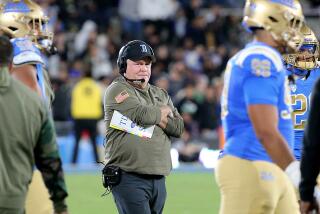Witness in Intelligence Furor May be Dead
- Share via
LONDON — Police in central England found a corpse Friday believed to be a missing Ministry of Defense scientist who was a reluctant figure in an uproar over allegations that the British government exaggerated evidence of Iraq’s arsenal to justify going to war.
Police said the body matched the description of David Kelly, an eminent microbiologist and former U.N. weapons inspector in Iraq. Kelly’s family had reported the night before that he had gone out for a walk, despite a rainstorm, and didn’t return.
The grim discovery in the countryside near Oxford stunned the government of Tony Blair. The British prime minister’s popularity has slumped because of a barrage of allegations that he -- along with the Bush administration -- hyped and distorted intelligence data while making the case that Iraq’s weapons of mass destruction were an urgent menace.
The Defense Ministry plans to open a top-level inquiry, a spokesman said aboard Blair’s plane as the prime minister arrived in Tokyo from Washington, where Blair had defended the war during a speech to both houses of Congress on Thursday.
Shortly before addressing business leaders in Tokyo, Blair called on “politicians and media alike to show some respect and restraint” while a judicial inquiry examines the circumstances of Kelly’s apparent death. “This is an absolutely terrible tragedy. I’m profoundly sad for David Kelly and his family,” Blair said.
Demanding that Blair return home immediately to deal with the crisis, the leader of the center-right opposition said the time has come for a full investigation of the government’s political blitz aimed at convincing a doubtful public that Britain should join the U.S. in toppling Saddam Hussein.
“We welcome the idea of an inquiry, we have been calling for one for a very long time,” said Iain Duncan Smith of the Conservative Party. “I am only sad it takes a tragedy like this to finally get the government to accept that.”
The body was discovered Friday morning in a field on the edge of a wooded area frequented by hikers and horseback riders a few miles from Kelly’s home. The remains would be formally identified today, said acting Supt. Dave Purnell of the Thames Valley police. He said police are treating the incident as an “unexplained death.”
“What we can say is that the description of the man found there matches the description of Dr. David Kelly,” Purnell told journalists. “At this very difficult time, our condolences must go out to his family, friends and work colleagues.”
There was no suggestion of foul play Friday. Speculation focused on suicide or a heart attack brought on by the strain of recent days. But that barely mitigated damaging repercussions that are likely to reverberate across the Atlantic. The Iraq-related woes of the Blair government and the Bush administration, which also faces allegations of politicized intelligence, have been intertwined and have magnified each other.
“What is obviously happening is that the British and American governments are beginning to come apart like an old coat with a loose thread,” said Rodney Barker, a professor of politics at the London School of Economics. “There is a sense that both governments are now looking for scapegoats and getting people to own up and take blame. Public faith in both governments seems to be sliding.”
Kelly, 59, was a civil servant largely unknown to Britons until he testified Tuesday before a parliamentary committee trying to determine whether he was the source of media reports accusing the government of exaggerating scientific evidence about Iraq’s arsenal. Legislators on Parliament’s Foreign Affairs Committee peppered him with questions, raising their voices as they suggested that he had been “thrown to the wolves” to protect senior officials.
The gray-bearded scientist looked dignified but acutely uncomfortable during the questioning. His answers were sometimes barely audible.
Although Kelly had endured the tensions and risks of hunting for weapons of mass destruction in Iraq, his wife, Janice, said the recent feeding frenzy tormented him, according to a BBC journalist who is a family friend.
“She said he was very, very stressed and unhappy about what had happened and this was really not the kind of world he wanted to live in,” Tom Mangold said in comments reported by the British Press Assn. news agency. Mangold said Kelly had returned home from London “very, very angry about what happened at the committee.”
Nonetheless, Kelly had come forward voluntarily to testify, said the committee chairman, Donald Anderson. He said the legislators regarded Kelly more as a victim than a culprit.
“If it was strong, the criticism appeared to be more directed against the Ministry of Defense, rather than against him,” Anderson, a member of Parliament for Blair’s center-left Labor Party, told BBC television. “So I don’t think the questioning was aggressive against him. I concede of course that it was wholly outside his normal experience. Therefore it must have certainly been an ordeal for him.”
Kelly’s ordeal grew out of a brawl that has pitted the venerable British Broadcasting Corp. against a government with a well-honed media strategy. The dispute concerns semantics, the political use of intelligence and the intrigues of spin doctors -- in some ways echoing the debate about the discredited line in Bush’s State of the Union speech that accused Iraq of trying to obtain uranium in Niger for a nuclear weapons program.
On May 29, Andrew Gilligan, a BBC radio journalist, reported that an intelligence source, described as a senior official, had told him that the government had “sexed up,” or hyped, scientific evidence in a dossier released last September about Iraqi weapons of mass destruction. That dossier had echoed the Bush administration’s aggressive rhetoric.
It claimed that the Iraqi tyrant had unconventional weapons that could be activated in 45 minutes. Gilligan reported that some in the intelligence community had argued that the statement was questionable, but they were overruled. That holds similarities to what happened in the case of the White House claim on uranium.
Gilligan went further three days later in a column written for the Mail on Sunday in which he accused Alastair Campbell, Blair’s communications director, of inserting the language about the 45-minute window for unleashing the weapons. Campbell and other officials reacted angrily, demanding apologies from the BBC for false accusations. The BBC stuck to its story.
Two parliamentary committees opened inquiries amid growing questions about the merits and integrity of the government’s case for war. Already, the government had been forced to apologize for the embarrassing revelation that some of its supposedly intelligence-based accusations had been lifted from a doctoral thesis.
On July 8, the defense minister announced that an “individual working in the ministry” had come forward to volunteer that he met Andrew Gilligan on May 22. The man was Kelly; he had written a background section of the September dossier, drawing on his work as a government defense researcher and his experience as a U.N. inspector in Iraq between 1991 and 1998. He told the committee that he had spoken to Gilligan in a London hotel and said the 45-minute language was probably included in the dossier for “impact.” But Kelly surprised observers when he said he did not think he was the main source. The legislators ultimately agreed, though they grilled him nevertheless.
In a heated moment, Labor legislator Andrew MacKinlay insisted that Kelly identify other journalists with whom he had spoken. Kelly resisted, saying the Defense Ministry would provide those names.
MacKinlay then declared: “I reckon you’re chaff. You’ve been thrown up to divert our probing. Have you ever felt like the fall guy? I mean, you’ve been set up, haven’t you?”
“That’s not a question I can answer,” said Kelly, fingers laced and voice low.
“But you do feel that?”
“No,” Kelly said. “I accept the process that’s going on.”
*
Stobart reported from London and Rotella from Paris. The Financial Times and Associated Press contributed to this report.
More to Read
Sign up for Essential California
The most important California stories and recommendations in your inbox every morning.
You may occasionally receive promotional content from the Los Angeles Times.













